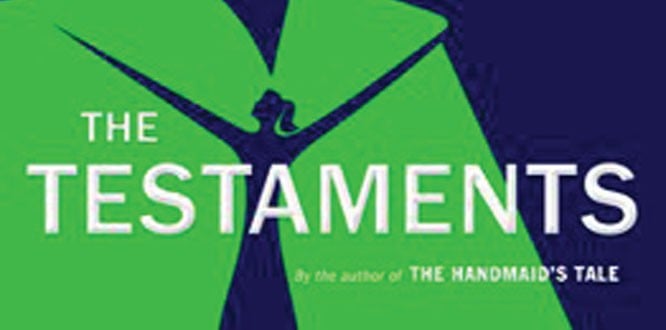
The publication of a sequel to The Handmaid’s Tale is a much anticipated event

Dear All,
On the evening of Monday September 9th, Margaret Atwood will launch her new novel, the sequel to her 1985 The Handmaid’s Tale, at Waterstone’s London Picadilly store. Some 400 people are attending the event, many of them dressed in the cloaks and bonnets worn by the handmaids of the religious fundamentalist republic of Gilead, the landscape of The Handmaid’s Tale. The event is being described as a "one night festival" and will include speeches by writers including Elif Shafak and Jeanette Winterson, culminating in Atwood herself reading extracts from the 432-page book. Then at midnight, the book will go on sale.
It’s probably fair to say that The Testaments is one of the most eagerly anticipated books of the year; it made the shortlist for the prestigious Booker Prize, even before publication, and the stories of how copies were sent to judges under tight security and with strict instructions are quite amusing. Part of the reason for the renewed interest in Gilead has to do as much with the gripping TV adaptation (starring Elizabeth Moss), as with the global political climate and the rise of Donald Trump.
The TV series of The Handmaid’s Tale brought to the screens the visual reality of the futuristic landscape Atwood had described in the book: a land where a fundamentalist system of ‘God’s law’ (as described in ancient scriptures)is in place, where punishments for any deviation are swift and brutal, a surveillance society which is overseen by men and where women are not allowed to either read or work, but are classified broadly as wives, handmaids or domestic help (called the Marthas). The rise of the fundamentalists is shown to have been possible due to a severe environmental crisis which has decimated birth rates in the United States. The ‘Crusaders’ create a religious republic in the United States where women’s roles in society are limited to the domestic arena, their identity is as a possession of the man -- a wife, a breeding vessel (the handmaid) or a domestic servant.
The TV series has come at a time where much of the futuristic landscape is not just credible, it is probable. It is a world where much is familiar, but much is unrecognisable – and terrifying. This is a sort of Christian version of an extreme model of a Saudi Arabia-type society, a place where women are not supposed to think or work, where they are deprived of both financial and intellectual independence. That this can happen in an instant is shown by the way it’s done in Gilead: women are cut off from their bank accounts, it is deemed illegal to employ a woman -- women become chattel.
The misogynist narrative that ‘women’s empowerment leads to destruction of society because it is an aberration of God’s law’ never really went away from our world and with the rise of religiously inclined political despots and groups it has seen a resurgence all over the globe. The women who wear the red handmaid’s uniform at anti-Trump protests seek perhaps to remind us how probable the Gilead landscape actually is.
What we know about the Testaments is limited, but apparently the story is in three parts, with three different voices. The cover visual shows a woman wearing not a red but a green cloak, leading to speculation that the narrators are not Handmaids but Marthas (who wear green). We also know that it is set 15 years after the final scene of The Handmaid’s Tale where the narrator was hauled into a van by armed men who might have been either regime soldiers or freedom fighters. It is unclear whether we will now learn of the fate of the original narrator or whether the book includes the sort of ‘historical note’ that forms the epilogue in the original novel.
We also know that The Handmaid’s Tale is now ‘the most borrowed adult novel from London libraries’ and that since the announcement of its sequel, at least one bookseller (Waterstones) ‘reports a 160 percent increase across Atwood titles.’ Gilead and its male guardians, its climate of fear and self righteousness, are not merely fantasy, it now seems more like a prediction.
Will this surge of popularity for Atwood’s work necessarily translate into her winning the Booker? Impossible to say as the novel is not yet available to read, but given the quality of Atwood’s previous work it certainly has a good chance. The only fear here is that the politics might overshadow the literary quality of the work… But then that’s a whole other question: must a great book be of its time and place or for all times and places?
A question worth mulling over.
Best wishes